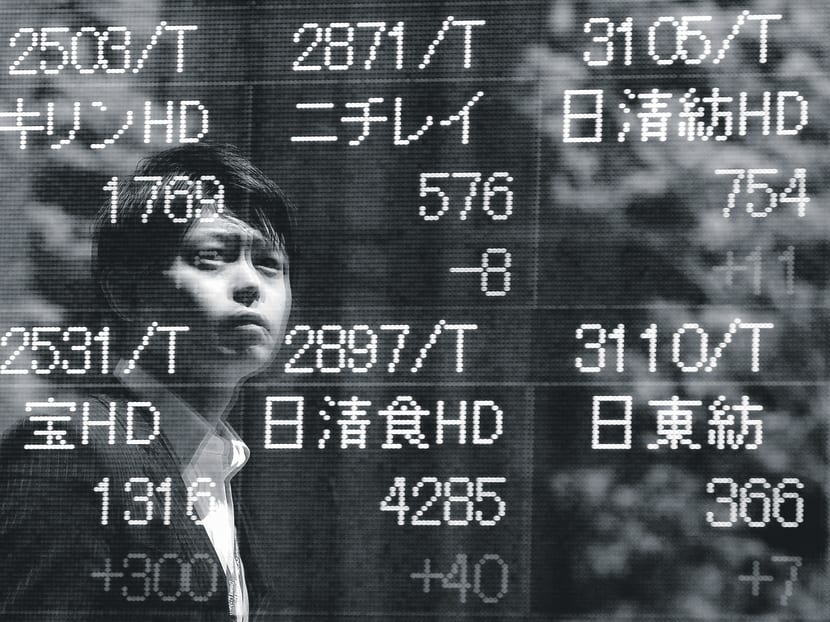What’s given Japan its mojo back
In all the excitement about Japan’s rediscovery of its long-lost mojo, one question has largely gone unasked. What made the country’s establishment change tack so suddenly?

Japanese shares hitting a five-year high on Wednesday. Market excitement is beginning to rub off on the economy as brokerages benefit from the new risk appetite among Japanese investors. Photo: Reuters
In all the excitement about Japan’s rediscovery of its long-lost mojo, one question has largely gone unasked. What made the country’s establishment change tack so suddenly?
One minute, the powers that be thought there was nothing much that could be done about deflation. The next, everyone had rallied around Mr Shinzo Abe, the new Prime Minister, and his mission to reverse 15 years of falling prices.
So dramatic has been the shift in policy — and so rapidly have markets responded — that everyone has been too busy making money to worry much about what triggered the change. The yen has weakened from ¥77 to the dollar to nearly ¥100, benefiting exporters. The broad Topix index is up 65 per cent in six months, the strongest rally in decades.
Stock market gains have added ¥150 trillion to the market capitalisation of Japanese companies, says Mr Peter Tasker, an analyst at Arcus Research. So grateful are investors for the bonanza, he jokes, that they now customarily sign off their emails: “All hail to Abe.”
Market excitement is beginning to rub off on the real economy. That supports those who contend that springing the deflationary trap can produce a self-perpetuating cycle in which profits, wages, consumer spending and taxes float higher.
Toyota, which tripled its net profits to nearly US$10 billion (S$12.2 billion) in the year to March, said on Wednesday that it expected profits to increase by another 40 per cent this year. Earnings at Nomura and Daiwa have surged as the brokerages benefit from the new risk appetite among Japanese investors.
In March, sales at large retailers posted their biggest gains in 20 years. Even wages at some companies have begun to edge up amid signs of a tightening labour market. The central bank is now predicting economic growth for this year of a not-too-shabby 2.9 per cent.
THE 2011 TSUNAMI AND CHINA
The policy, then, is working better than anyone could have expected — at least so far. But what caused Japan to embrace Abenomics in the first place? It is never easy to establish cause and effect. Yet there do seem to have been two strong catalysts for the sudden shift in gear: The 2011 tsunami and China.
The galvanising effect of the March 2011 tsunami was not immediate. The Japanese initially headed off a potential energy crisis — following the shutdown of all the country’s nuclear plants — by pulling together to cut energy consumption. Yet industry’s concern about an expensive and erratic energy supply raised the spectre of a mass exodus.
Businesses were already complaining about the high yen, steep corporate taxes, lack of trade agreements and stiff emissions targets. For the first time in a generation, there were genuine questions about whether whole industries would decamp.
The second factor has been China, whose economy overtook Japan’s in 2010. Beijing has become increasingly assertive over its claims to the Japanese-administered Senkaku, five uninhabited islands known as Diaoyu by China.
In the run-up to Mr Abe’s election as leader of the Liberal Democratic Party (LDP) — a prelude to the premiership — violent anti-Japanese demonstrations broke out in more than 50 cities across China. If Japan has found a leader with a sense of purpose, it might have China to thank for it.
RICH COUNTRY, STRONG ARMY
The link between fears over its security and a sense of economic weakness is old and deep. Fukoku-kyohei (rich country, strong army) was the rallying cry of Japanese modernisation after the Meiji Restoration of 1868.
To Mr Abe, the slogan resonates loudly. Put simply, it means that if Japan’s economy is weak, so is its ability to defend itself.
Mr Abe has not abandoned his nationalism. His mission to revive the economy stems from precisely the same impulse.
In his February “Japan is Back” speech in Washington, he made the link explicit. “Japan must stay strong, strong first in its economy, and strong also in its national defence.”
The backdrop to the country’s bold economic experiment has been a strengthened patriotism. Even Emperor Akihito was taken aback when Mr Abe and other attendees at a ceremony to mark the anniversary of Japan’s return of sovereignty at the end of the US occupation in 1952 shouted banzai — long live the emperor.
Mr Abe, who is riding high in the polls with support above 70 per cent, is fired up by the idea that the country can regain its economic and geopolitical clout simultaneously.
“In order for us, Japan and the US, to jointly provide the region andthe world with more rule of law, more democracy, more security and less poverty, Japan must stay strong,” he told his US hosts in February.
The motivation is important. After years of drift, Japan has been galvanised into action. If history is any guide, now that consensus has been reached, it will proceed faster and with more purpose than might be assumed after two decades of dithering.
Mr Abe has already surprised many by committing Japan to negotiations for the trans-Pacific Partnership, a high-level trade pact that would expose Japan’s economy to fiercer competition. To sign up would mean tearing up the LDP’s social contract with the country’s cosseted farmers.
On the face of it, that might seem unlikely. So might other long-discussed imperatives: Liberalising energy and healthcare, or getting more women into the workforce. Until recently, you would have bet against any of this happening. But there is a new urgency about Japan. Sceptics may be surprised.
ABOUT THE AUTHOR:
David Pilling is the FT’s Asia editor.






